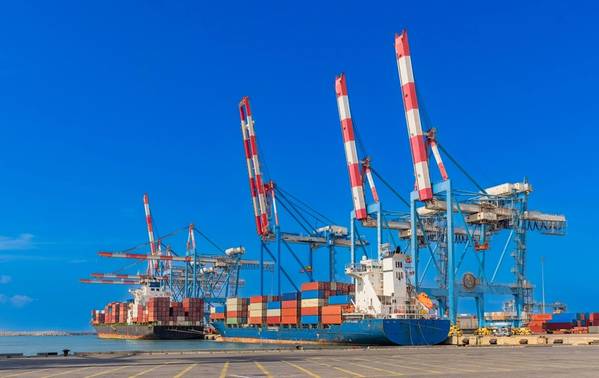
Activity at Israel's ports is slowing after Saturday's attacks by Islamist group Hamas on towns close to Gaza, with the cost of insurance premiums for Israeli shipments soaring amid tightening supplies of food stocks, according to sources and data.
Israel's southern coastal city of Ashkelon, which has a small port well in range of Hamas rockets, is not allowing ships to enter, shipping sources said.
While the main Israeli ports of Ashdod further up the coast and Haifa in the north, remain open, shipping and maritime security companies are reviewing their operations for Israel, industry sources said.
"Israeli ports are deemed to be at heightened risk," said Noah Trowbridge, with British maritime risk advisory and security company Dryad Global.
"With continuous rocket barrages expected from Gaza, alongside the potential for a protracted conflict, the damage to port infrastructure becomes increasingly probable."
Ashdod port said workers continued to work regularly despite the emergency situation.
"The port's berths are open as much as needed and we are offering a response to meet all Israel's needs," Ashdod port said in a statement.
German container shipping company Hapag Lloyd told Reuters that Ashdod port had imposed restrictions on the loading or discharging of dangerous cargo, which includes flammable, explosive or toxic substances, adding that the company was monitoring its shipping services to Israel.
Shipbroker BRS said security had been stepped up at Israeli ports, adding that the principal threat to shipping coming into Israel was from rockets fired from Gaza and from "hostile forces" on the ground in Israel after Hamas fighters infiltrated the country.
"Since Gaza has a coastline, direct threats to shipping inside Israeli waters cannot be ruled out," BRS said.
Israel is among countries in the Middle East already considered a high risk area by insurers in the London insurance market, a key centre for marine insurance cover.
Ships pay an additional war risk premium for seven-day voyages to Israel. Since Saturday's attacks additional premiums have soared ten fold to around 0.15-0.2% of the value of a ship - translating into tens of thousands of dollars of additional costs. This compared with a premium of 0.0125% earlier this year, insurance sources said.
Empty shelves
Nearly all of Israel's trade is via the sea. It is a food producer, but relies on imports for the majority of its grain needs, as well as quantities of fish, beef, nuts and consumer food products.
Residents across Israel reported many neighborhood supermarkets had bare shelves and low inventories of food staples as consumers stocked up in anticipation of a prolonged war.
The Israeli army's homefront command reposted on Monday its standing guidance for being prepared in times of emergency, which includes families collecting water and food for up to three days, as well as medicine and flashlights.
Danish container shipping group A.P. Moller Maersk said on Tuesday it continued to accept container bookings to and from the country.
Israel's leading container shipping carrier Zim said it was offering its vessels for "national needs".
"The company's ships will be directed, as a first priority, to transfer cargo from anywhere in the world to Israel according to the requirements and needs of the Ministry of Defense and the government of Israel," ZIM CEO Eli Glickman said on Facebook.
There were growing risks facing merchant shipping connected to Israel.
INTERTANKO, the association which represents the majority of the world's tanker fleet, said in an advisory to members this week that after the Hamas attacks, it expected tensions to rise in the broader Middle East Gulf and Gulf of Oman, with heightened risks for shipping connected to Israel.
“Ships and cargos with a connection to Israel or Israeli nationals (however tenuous) have also been subject to attack,” INTERTANKO said.
(Reuters - Reporting by Jonathan Saul and Ari Rabinovitch; Editing by Sharon Singleton)



